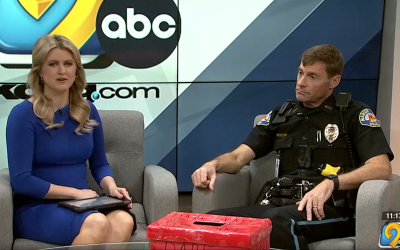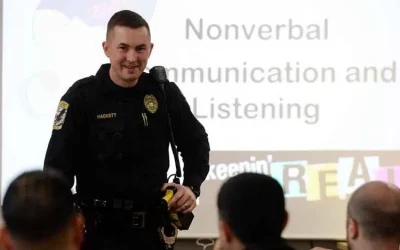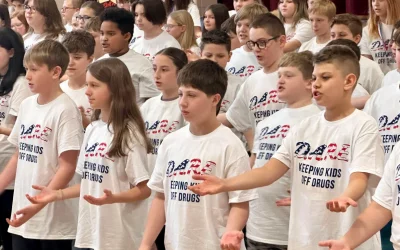
Navigating teen life while confronted with current issues like vaping, teen suicide, social media bullying, and illicit drugs, including today’s opioid epidemic, mean young people today must make critical choices at an early age.
The hopeful news is communities that work together can make a big difference in the lives of children and young adults.
For 36 years, D.A.R.E. has been committed to helping young people make good decisions that support a safe and healthy life, and we’ve learned a few things about effective prevention through partnering with schools, families, and law enforcement in communities across the United States and the world.
Today, communities can implement prevention programming that is more effective than ever, with decades of scientific evidence guiding the way. Here are three big ideas that are supported by research:
- Effective prevention programs are community-wide, with consistent messaging about risk behavior appearing in more than one setting. For example, school-based prevention programming that is reinforced by family talks at home or a city-wide social norms campaign. Community programming should address issues highly relevant to the local area. Families can boost this effect by encouraging conversation about risk behaviors at home. It helps when many community members are involved in shaping teens’ thoughts about challenging issues — especially when they offer an opportunity to see things in new ways. Pacific Grove (Calif.) Police Department school resource officer Justin Hankes sees this happen almost every day at the schools he serves. He says “getting the chance to connect with students and teachers in the classroom provides each of us with a broader understanding of the other’s perspective — we live in the same community and want to live happy and healthy lives. My job allows me to connect with kids in my community to foster leadership and a culture of safety and care.”
- Another thing to look for is long-term prevention programming. Although speakers or school assemblies may provide information or a motivational boost, they are most effective when they supplement an effective program that connects with kids at multiple ages or grade levels, with repeated contacts over time. It takes time to build the skills needed to avoid risk with good decisions. To maximize success, it’s critical for kids to practice these skills when they are young. It’s equally important that teens continue to be engaged in prevention activities at the ages when they will start to be faced with new challenges, in order to effectively apply these skills in real-life scenarios.
- Good prevention programs for elementary-age children are based in social-emotional learning — teaching kids the skills they need to understand and communicate how they are feeling, exercise control over their bodies and minds, and to interact with others. As children transition into middle and high school, programs should continue to focus on peer relationships and social competence at a more complex level. Programs should help teens develop the knowledge and experience to make decisions that align with their own values and goals, and the skills to effectively and confidently express their choices, even under pressure.
By Ashley Frazier, Ph.D., Director of Curriculum and Training, D.A.R.E. America
Here’s what D.A.R.E. is teaching kids about weed
Aside from living through the first iteration of social media and being the final group to understand what an internet dial tone sound is, Millennials were also the first full generation to go through the classic Drug Abuse Resistance Education (D.A.R.E.) program....
Marion police officer talks about D.A.R.E. classes
From KCRG.com: Marion Police Officer Tom Daubs joins KCRG to talk about D.A.R.E. classes
Key Addiction Points You Need to Know
Substance use disorder (SUD) is the nation’s most pressing public health challenge, and the most urgent SUD in 2024 is opioid abuse and dependency. According to the CDC, more than one million people have died since 1999 from drug overdose…
Old Lyme Officer Revives D.A.R.E. Program After Two Decades Hiatus
Officer Stephen Hackett of the Old Lyme Police Department is set to become the town’s first Drug Abuse Resistance Education (D.A.R.E.) instructor in over two decades. With a new focus on skill-building, the updated D.A.R.E. program aims to empower the town’s youth to make responsible choices.
Mental Health Stigma: Life or Death
The pervasive stigma against people with addictions, particularly opioid use disorder (OUD), is a major problem requiring urgent attention in the United States. Stigma is likely at least part of the reason why only 1 in 5 individuals with opioid dependence receives…
Former YAB Member and D.A.R.E. Scholarship Awardee Julia Manning is now a Police Officer for the Park Ridge Police Department
Julia Manning was an active member of the YAB (Youth Advisory Board) from 2016 to 2019, and she is now proud to be an alumni of the program. In recognition of her outstanding achievements, she was honored with the prestigious 2019 D.A.R.E. America Louis 'Skip' Miller...
150-Plus Students Graduate Russell D.A.R.E. Program
Russell Elementary students graduated from the D.A.R.E. program at Russell-McDowell Intermediate School on Monday. About 153 fifth-grade students — all wearing white shirts that read “keep kids off drugs” — filled the gymnasium early afternoon Monday to be recognized...
Students Graduate from D.A.R.E. Program at Mary Queen of Peace
Four classes at Mary Queen of Peace in Mount Pearl have graduated from the RNC’s Drug Abuse Resistance Education program. The ten-week series of classroom lessons, led by an RNC officer to grade six students, teaches children how to live productive drug-free and...
Hundreds of Students Graduate from MPD’s D.A.R.E. Program
MEMPHIS, Tenn. — Memphis Police celebrated with hundreds of local students as they graduated from the D.A.R.E. program Wednesday. For 40 years, D.A.R.E. has been teaching children about the dangers of high-risk situations with alcohol, drugs, and bullying. MPD…
Copyright © 2022 D.A.R.E. America. All Rights Reserved.
Copyright © 2022 D.A.R.E. America.
All Rights Reserved.











